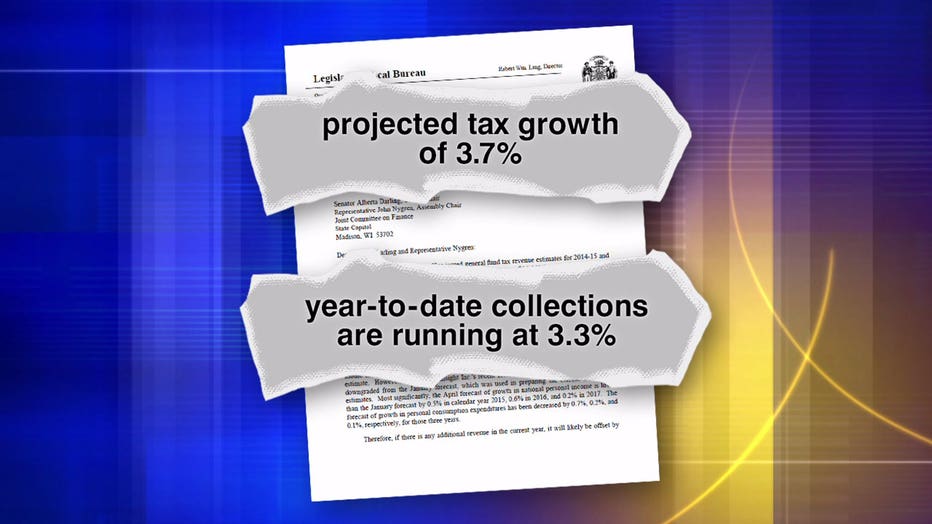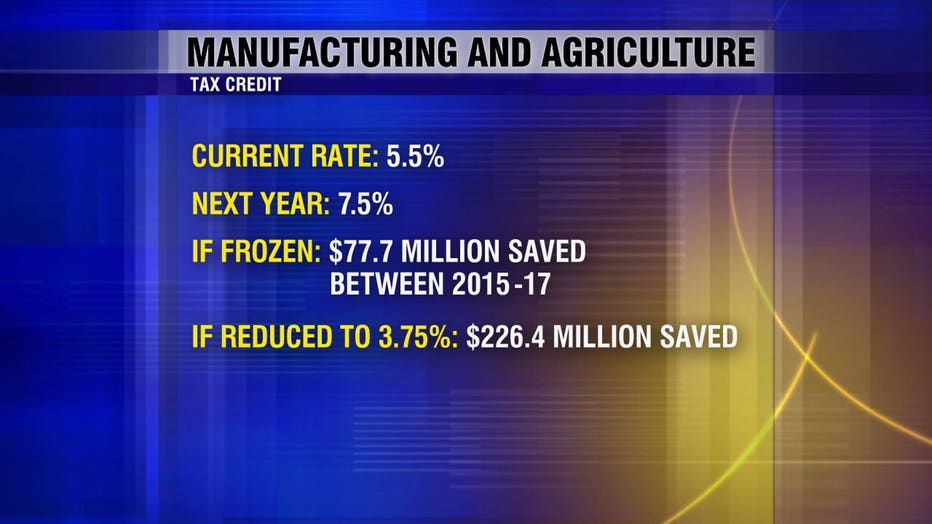State revenue is lagging but what does that mean for taxpayers?
MADISON (WITI) -- No new state revenue. That's the word from Madison -- where a new report shows tax collection isn't growing as fast as expected. Democrats and Republicans are split over what that means for taxpayers.
"Start looking seriously at the revenue we have and additional choices we could make," Rep. Chris Taylor (D-Madison) said.
That's the message from Wisconsin Democrats Wednesday, May 6th following the release of a tax report from the Legislative Fiscal Bureau. In January, it projected tax collection revenue would increase by 3.7% over the last fiscal year. So far, that growth to date is 3.3%.

"Going forward, I don`t think anything really changes as far as our priorities in the budget process," Rep. John Nygren (R-Marinette) said.
In a joint speech, Assembly Republicans pointed to the report's conclusion: That the estimates are still reasonable and shouldn't be adjusted. GOP leaders are touting a plan that would preserve $127 million that would have been cut from K-12 education in Governor Scott Walker's proposed budget.
"The levy credit is basically a way to buy down property taxes, so the governor made a double payment in that regard, so what we would do is not make that double payment. We`d make a payment that`s been similar -- traditionally, a single payment," Rep. Nygren plan.
Democrats are pushing another plan they say would generate even more money for education.
"They`re not prioritizing the needs of the state of Wisconsin. They`re prioritizing big tax giveaways to big corporations," Rep. Taylor said.
The manufacturing and agriculture tax credit is currently set at 5.5%. Next year, that credit is set to increase to 7.5%. Freezing that credit where it is would save about $78 million. Reducing it to last year's rate of 3.75% would save $226 million, but Republicans say that's a non-starter.

"It`s not surprising to me that when we are faced with a deficit, the first thing Democrats propose is to either increase taxes or delay tax cuts that have already been proposed so that`s not shocking. I think that would be the last priority of our caucus, not the first as it is with Democrats," Rep. Robin Vos (R-Rochester) said.
Democrats say freezing corporate tax credits would also free up more money to limit cuts to the UW-System.
Republicans say they want to minimize those cuts, and will talk about that in the coming days -- but they emphasize their top priority is funding K-12 education.
Assembly Minority Leader Peter Barca (D-Kenosha) issued this statement:
“These weak revenue projections are another indication of the harm that three rounds of Republican budgeting, as well as their anemic economic development efforts, has done to our state.
While our neighboring states take advantage of an improving national economy and are experiencing large budget surpluses, Wisconsin continues to lag behind due to Republicans’ irresponsible budget choices and their poor economic development policies that have left Wisconsin 40th in the country in job growth. We can and must do better for the people of Wisconsin to ensure long-term economic prosperity.
Our community schools are hurting from Republicans’ actions and schools will continue to struggle even if Republicans restore their own proposed cuts. Time and again, Republicans have sold out Wisconsin schools and instead chosen massive tax giveaways for the corporate special interests and donors who fund Gov. Walker’s campaigns.
The sad truth is that Gov. Walker’s presidential ambitions – which are being carried out by Republicans in the legislature – will harm Wisconsin communities for years to come.”
Assembly Majority Leader Jim Steineke (R-Kaukauna) released this statement:
“The Legislative Fiscal Bureau’s report confirms that Wisconsin’s revenue estimates are consistent with previous estimates. The Bureau said that future revenue growth is expected to be around 4-5 percent. Now that we have the most accurate picture of our state’s finances, Assembly Republicans will move forward with our top priority - investing in K-12 education. We will make the necessary changes to restore the cut to education funding and fully fund our public schools in this two-year budget.”
Joint Finance Committee co-chairs Sen. Alberta Darling and Rep. John Nygren issued this statement:
"Despite a challenging national economic forecast, Wisconsin's revenue collections remain steady according to the non-partisan Legislative Fiscal Bureau. The Bureau says collections are on target from previous estimates and future growth for Wisconsin is expected around 4-5%.
Budgeting is about priorities. This session, as in the past, it's our top priority to invest in K-12 education and continue to protect Wisconsin taxpayers.
Wisconsinites are better off today because of the prudent financial decisions we made last budget. We've already returned over $2 billion to the hardworking taxpayers of our state. This budget, we will build upon these reforms to continue moving Wisconsin in the right direction.
As we move forward with the budget process, we will remain dedicated to investing in public education, protecting taxpayers, and growing our state's workforce."
Joint Finance Committee Democrats Sen. Lena Taylor, Sen. Jon Erpenbach, Rep. Chris Taylor and Rep. Gordon Hintz issued this statement:
“Republicans have been holding off on any action on their deeply unpopular budget because they thought a dramatic increase in revenue would magically appear to save the day,” said Representative Gordon Hintz (D-Oshkosh). “Unfortunately that hasn’t happened. But the real failure is that we should have never been in this position to begin with.”
"The public opposes Governor Walker’s budget because it puts his presidential ambitions ahead of the needs of Wisconsin,” said Senator Lena Taylor (D-Milwaukee). “While no new funds will be available, we already have enough money in our state budget to prioritize important programs like public education and health care.”
“With his complete failure to grow our economy, a deeply unpopular budget, and plummeting approval numbers, I get why the Governor would rather be in any other state but Wisconsin,” said Senator Jon Erpenbach (D-Middleton). “It’s time for the Governor and Republicans to stop the political posturing and start governing. This budget is wrong for Wisconsin in more ways than can be counted, and Republicans need to simply start over.”
““We’re in this mess because of bad decisions made by Gov. Walker and legislative Republicans. Promising pots of gold at the end of the rainbow – the magic money the GOP was counting on is not there. Republicans gave massive tax giveaways to corporations and rich donors and are prioritizing Gov. Walker’s presidential race above the needs of our state,” said Representative Chris Taylor (D-Madison). “As we have said time and time again, Republicans must re-prioritize using sufficient existing revenues to fund our public schools, UW system and long term care needs. It’s time to go back to investing in the values that once made our state great.”
Senator Mark Miller (D-Monona) issued this statement:
“The Legislative Fiscal Bureau notified the Joint Committee on Finance that there will be no additional revenue available for the budget. This will be very bad news for Governor Walker whenever he comes back from wherever he currently is.
Legislative Republicans were hoping for a miracle to fix the budget that Scott Walker built. How long are they going to blindly follow him while he runs for president and how long do the people of Wisconsin take a backseat to the ambitions of Scott Walker?
Legislative Republicans are selling out Wisconsin in this budget so Scott Walker can run for President. They can’t all get appointed to his cabinet.”
Senator Chris Larson (D-Milwaukee) issued this statement:
“Despite a national growing economy nationally and significant revenue growth in neighboring Midwestern states like Minnesota, which is expecting a $2 billion surplus, Wisconsin continues to fall further behind because of extreme GOP policies. Instead, they have created a self-inflicted $2.2 billion deficit.
Instead of focusing on Wisconsin’s traditional shared values over the past five years, currently the Republicans in power have been consumed with historic slashes to education funding and denying our neighbors access to basic health services and family-supporting jobs, while at the same time widening tax loopholes for the wealthy and corporations.
On one hand, Minnesota is flush with cash and reaping the benefits because they have invested in their public schools, raised wages for families, and expanded access to affordable health care. On the other hand, Republicans in Wisconsin have been busy selling out our state to the lowest bidder.
Now is the time for a course correction. Governor Walker must put his personal ambitions on hold and Republicans in the legislature must look past their extreme ideology and work with Democrats to start investing in pro-growth policies that represent the shared values of the state and our citizens to get us out of this budget crisis.
We can do this by moving forward with accepting the federal Medicaid expansion and by pausing the costly Manufacturing and Agriculture Tax Credit.
It is time to end the regressive era in Wisconsin politics and get the state moving forward again.”
John Forester, director of government relations for the School Administrators Alliance issued this statement:
“The School Administrators Alliance joins the majority of residents across Wisconsin in asking the legislature and governor to prioritize public education in our state.
Toward that end, we urge Wisconsin lawmakers to restore the $127 million cut in per-pupil categorical aid in the first year of the biennial budget. We also ask them to support an inflationary increase in per-pupil revenues in each year of the biennium. Anything less than an inflationary increase in per-pupil revenues will require reductions in educational opportunities for public school children across Wisconsin.
Much of the money needed to fund our public schools in this budget already exists. In his budget plan, the governor proposes spending $211.2 million in increased school levy credits that flows to taxpayers as property tax relief and $108 million in proposed increased general aid with no corresponding revenue limit increase—and our school leaders cannot spend one dime of this money. Wisconsin lawmakers should support putting this ‘school funding in name only’ into a form that school leaders can spend on the educational needs of children.
Finally, we are grateful to the legislators who have made public education a priority in this budget process and to the educators, parents and other community leaders across the state for their advocacy efforts on behalf of Wisconsin public schools.”

